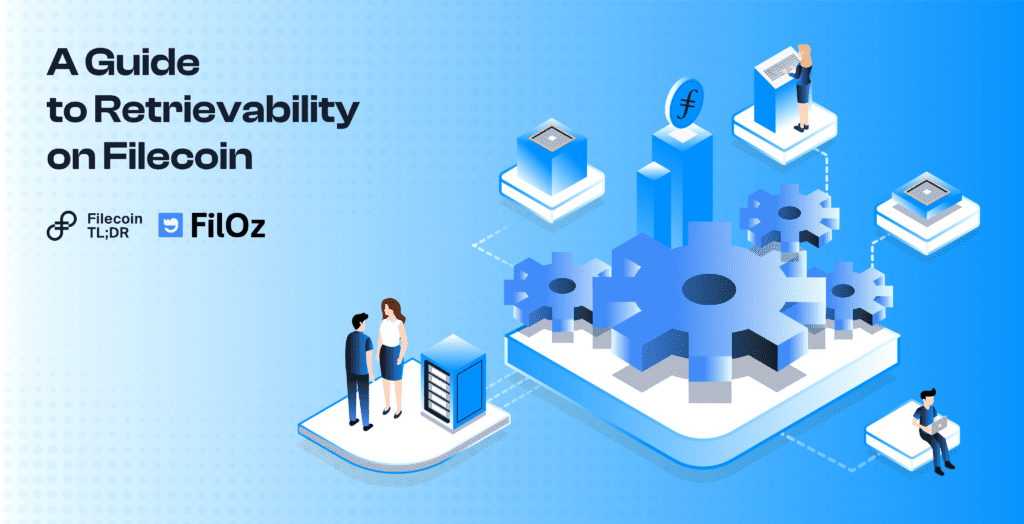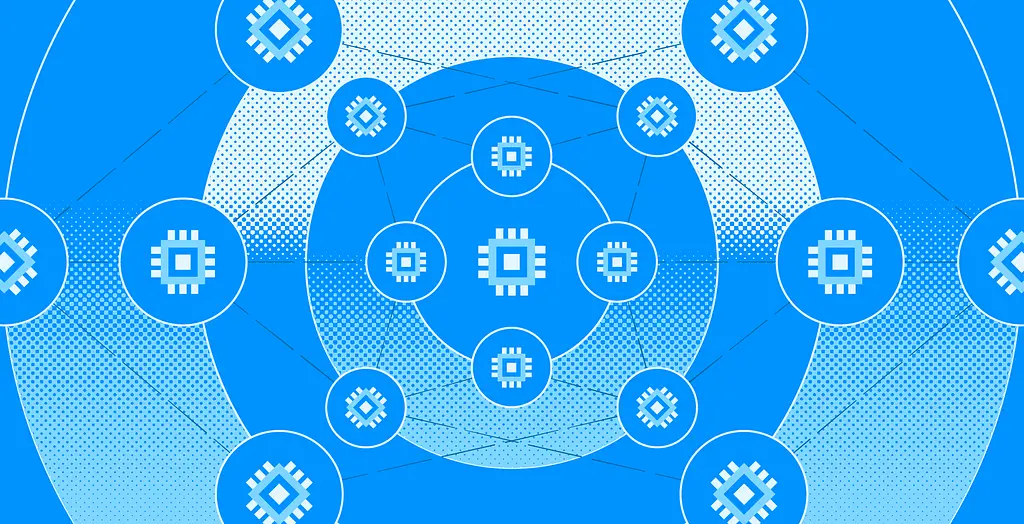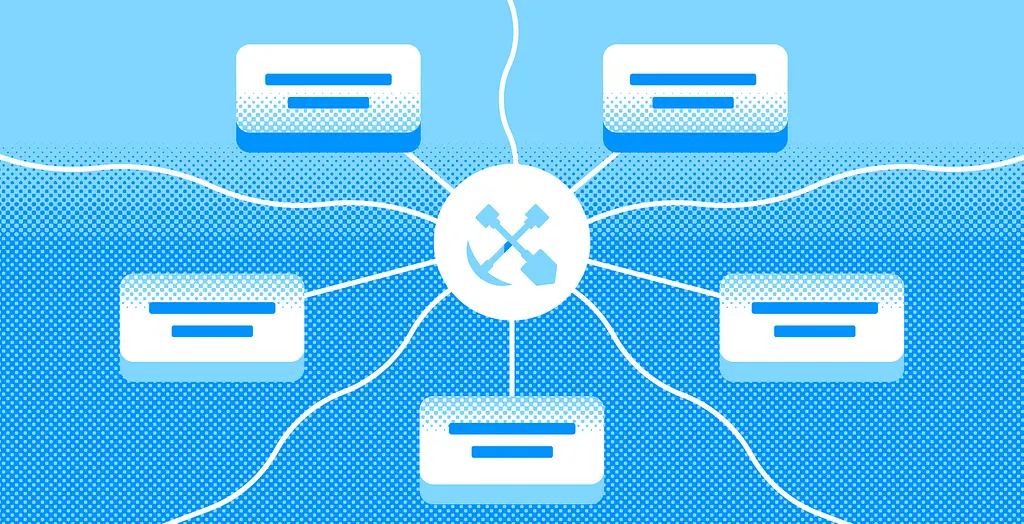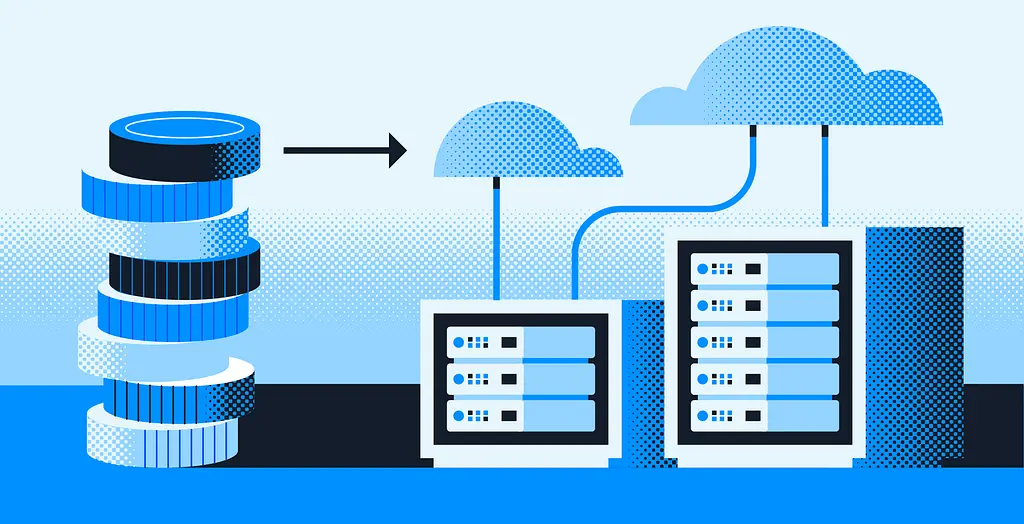Editor’s Note: This blogpost is a summarised repost of the original content published on 26 March 2025, by Luca from FilOz. Founded in 2024, FilOz is a team of 14 protocol researchers, engineers, TPMs, and community engineers focused on securing, upgrading, and expanding the Filecoin network.
Introduction
As Web3 applications mature, fast and reliable access to data becomes just as important as storing it. Whether it’s video streaming, serving assets for dApps, or powering AI agents with on-demand data, retrievability is a foundational piece of user experience.
Unlike traditional cloud providers where data retrieval is instant and guaranteed by a centralized service (often aided by CDNs), retrieval of data in Web3 introduces new challenges — spanning considerations around network performance, data redundancy, storage provider reliability, and incentive alignment. Filecoin has built the world’s largest decentralized storage network and how to tackle retrievals on that foundation deserves some exploration. How should Filecoin evolve its retrieval capabilities in a decentralized internet? What is the best approach for its users?
This guide aims to unpack the state of Retrievability on Filecoin, exploring where we are today and where improvements are needed. What we will aim to cover:
- Overview of Retrievability on Filecoin, including key strategies, challenges, and improvements
- Explore retrieval strategies and protocols, their guarantees, and limitations
- Outline payment models and how SPs and clients can select each other
- Highlight potential protocol-level improvements to enhance retrievability
Retrievability on Filecoin
Filecoin enables decentralized storage, allowing clients to store data with Storage Providers (SPs) and retrieve it on demand. Unlike storage, which is provable through Proof of Replication and Proof of SpaceTime, retrieval is a separate process that isn’t always provable, depending on protocols and strategies addressing various challenges.
Retrievability on Filecoin is influenced by factors such as:
- Network and SP performance
- Data availability
- Retrieval optimization protocols
There is no one-size-fits-all solution for retrievability. The best strategy depends on a client’s needs, including retrieval speed, reliability, and cost constraints. Clients can choose simple retrieval from a single SP for non-critical data or more complex solutions like redundancy, SLAs, or off-chain backups for mission-critical files. Advanced protocols, like Spark or CDN integration, offer higher performance but come with added costs or complexity.
Trust plays a crucial role in decentralized storage networks like Filecoin. Without trust, retrieval failures or delays can occur, especially with payment strategies like upfront payments. A CDN-like solution (e.g., retriev.org) could address these trust challenges by:
- Providing monitoring services to ensure SPs meet obligations
- Offering arbitration to resolve disputes and penalize non-performing SPs
- Ensuring retrieval promises are backed by financial incentives and penalties
Filecoin offers various retrievability options, from redundancy models to retrieval networks and off-chain solutions. Below is a summarized table of these options:
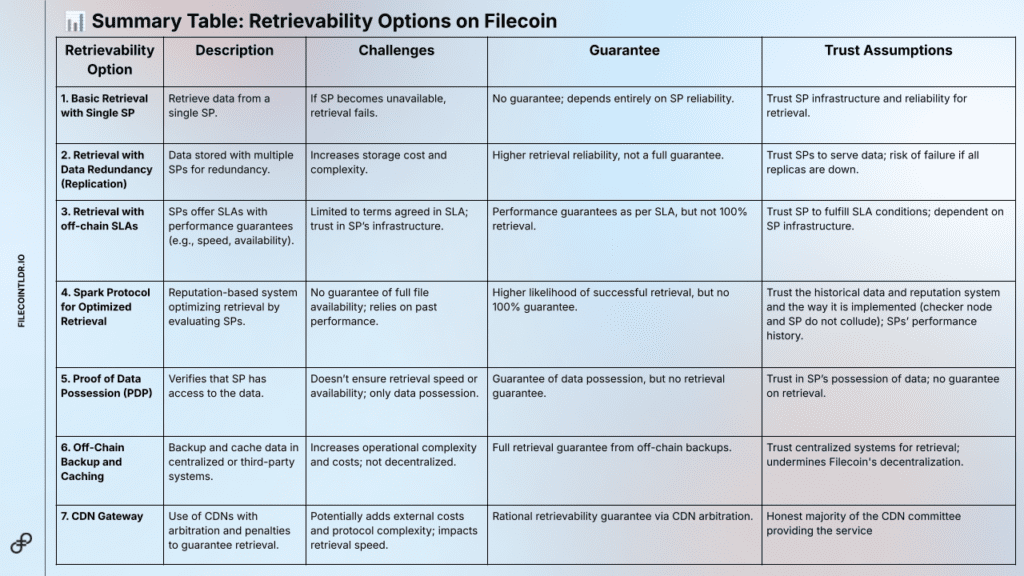
Key Metrics
When evaluating retrievability, clients need to consider several performance metrics that measure different aspects of the data retrieval process. These metrics ensure that data is not only stored but also accessible and retrievable efficiently when required. Key metrics include:
- Availability Metrics: Measure the likelihood of data being accessible and quickly recoverable when issues arise. High availability and redundancy ensure retrieval even if some systems or replicas fail.
- Performance Metrics: Assess retrieval speed and responsiveness, impacting user experience. Factors like throughput and latency are influenced by network bandwidth and data availability.
- Reliability Metrics: Reflect the consistency and stability of data retrieval, including success rate, error rate, and data integrity. High uptime ensures high availability, while a low error rate guarantees data accuracy and successful retrieval attempts.
- Cost-related Metrics: Help balance performance with cost efficiency, particularly in managing retrieval speed, bandwidth usage, and associated costs.
- Quality Metrics: These metrics measure the overall quality of the retrieval process, ensuring a satisfactory user experience.
By grouping the metrics into these categories, clients can evaluate retrievability from multiple dimensions, ensuring efficient, reliable, and cost-effective data access. Below is a comprehensive list of key retrievability metrics, grouped by their category:
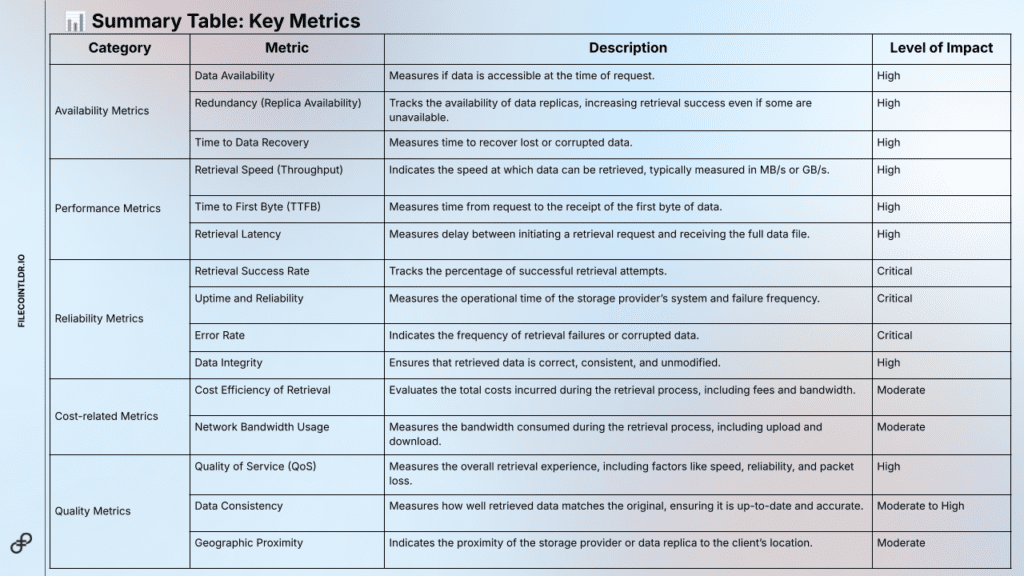
Payment Models
Retrievability on Filecoin combines payment options (how value is transferred) with payment strategies (when and under what terms payments occur). This modular structure allows clients and Storage Providers (SPs) to tailor agreements based on performance, trust, and cost considerations.
Payment Options – methods used to pay for data retrieval:
- Off-Chain Payments: Peer-to-peer arrangements that are typically fast and gas-free but rely on trust between parties.
- On-Chain Payments (FIL): The native token used for transparent, trustless retrieval settlements.
- On-Chain Payments (Stablecoins): e.g., USDFC, offering price stability and compatibility with broader ecosystems.
- On-Chain Payments (ERC-20 Tokens): Enables use of other tokens for interoperability with DeFi and cross-chain networks.
Payment Strategies — structures for when and how payments are made:
- Upfront Payment: Clients pay the full cost of retrieval in advance.
- Pay-to-Retrieve: Payments are made on a per-retrieval basis, similar to a metered model.
- Periodical Payment: Recurring payments that grant ongoing or unlimited retrieval access.
- Retrievability Tickets: Prepaid, redeemable claims for future data retrievals.
- Hybrid Models: Flexible approaches that combine aspects of multiple strategies to optimize for specific needs.
Retrieval Services: SP Selection & Client Selection Strategies
Selecting Storage Providers (SPs) for retrievability in Filecoin requires balancing control, cost, reliability, and trust. This process involves two key aspects: the deal-making process and the selection mechanism. Just as clients must carefully choose SPs, SPs also evaluate which client retrieval requests to fulfill, following the same two key components—deal-making and selection mechanisms.
Deal-Making Process
The deal-making process determines how clients and Storage Providers (SPs) establish retrieval agreements, balancing control, efficiency, and risk. It involves two key approaches:
- Direct Negotiation: Clients and SPs engage directly to define retrieval terms, including cost, performance guarantees, and service conditions. This method offers full control but requires manual effort and carries risks such as extended negotiations, misunderstandings, and potential SP unreliability.
- Automated or Delegated Deal-Making: Intermediaries or automated systems—such as content delivery networks (CDNs), smart contracts, or auction systems—facilitate the process. This reduces manual effort, optimizes terms based on real-time data, and enables market-driven pricing. However, it can introduce additional costs, reduced control, and reliance on third-party mechanisms for enforcement and dispute resolution.
SP Selection Mechanisms (POV of a Client)
Once the deal-making process is determined, the actual selection mechanism defines how the SPs are chosen. These can range from reputation-based systems to auction-based or automated selections.
Below is summarised table on the various selection mechanisms:
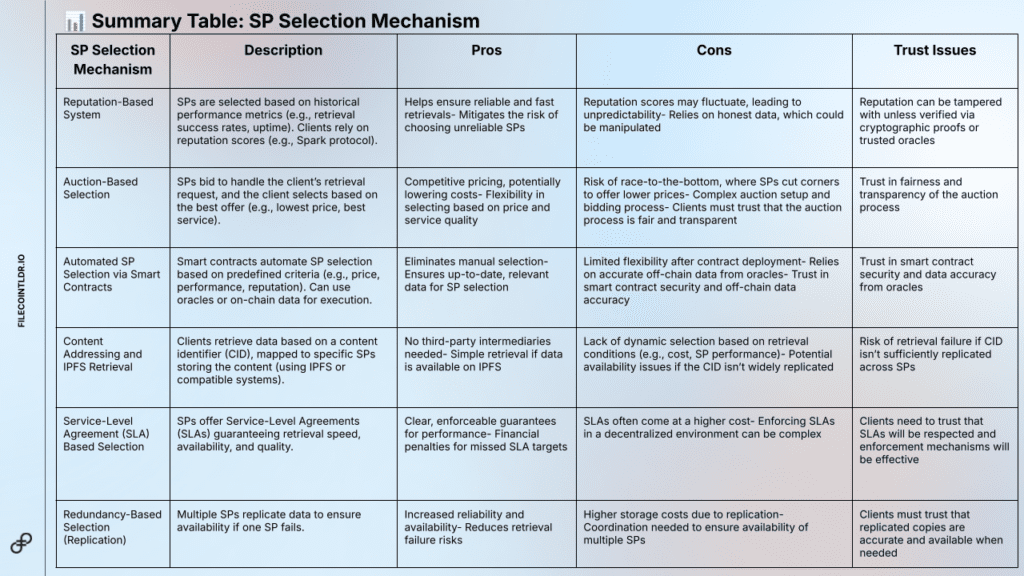
Client Selection Mechanisms (POV of a Storage Provider)
Once the deal-making process is determined, the client selection mechanism helps further narrow down on which clients’ retrieval requests the SP wishes to fulfill. Below is a summarised table to cover the various mechanisms:
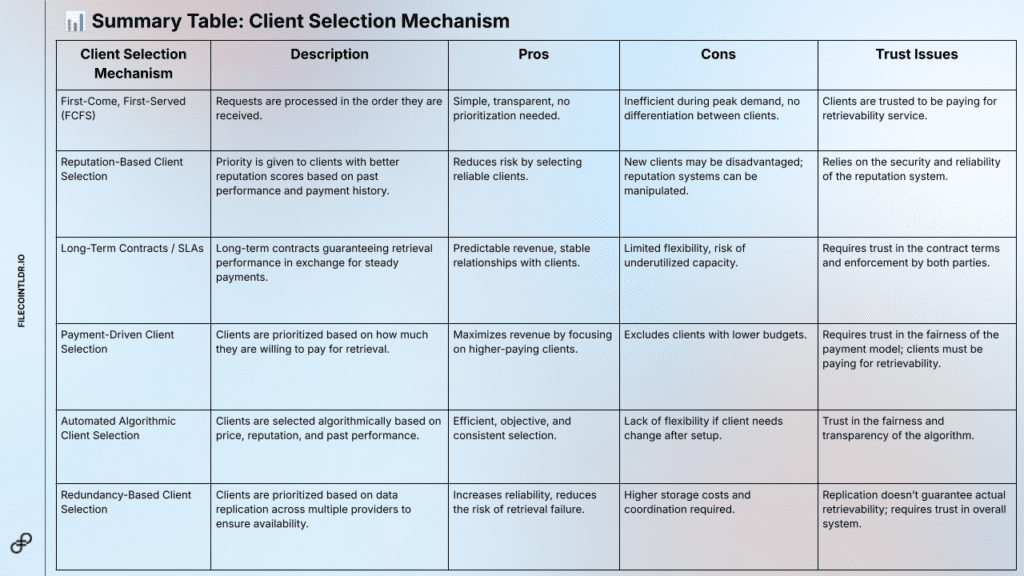
Next Steps
Retrievability guarantees for data stored on the Filecoin Network is essential for its long-term success and sustainability. However, we also recognize that each user may have distinct needs, preferences, and requirements when it comes to data accessibility and security guarantees.
To address this, we foresee a modular approach that allows users to select from a diverse range of services and combine them in a way that meets their specific retrievability and reliability goals. This flexibility will enable users to tailor their storage solutions to their unique use cases, ensuring both customization and scalability.
A promising path forward for enhancing retrievability guarantees on the Filecoin Network involves integrating advanced protocols and tools. By leveraging technologies and protocols like CDN Gateways, reputation systems, smart contract-powered storage solutions and incentives, we can create a more robust and reliable infrastructure.
These combined innovations will not only improve data accessibility and security but will also foster the overall growth and resilience of the Filecoin ecosystem.
For more pieces from FilOz, check out their Medium page here.
To stay updated on the latest in the Filecoin ecosystem, follow the @Filecointldr handle or join us on Discord.
Disclaimer: This information is for informational purposes only and is not intended to constitute investment, financial, legal, or other advice. This information is not an endorsement, offer, or recommendation to use any particular service, product, or application.
